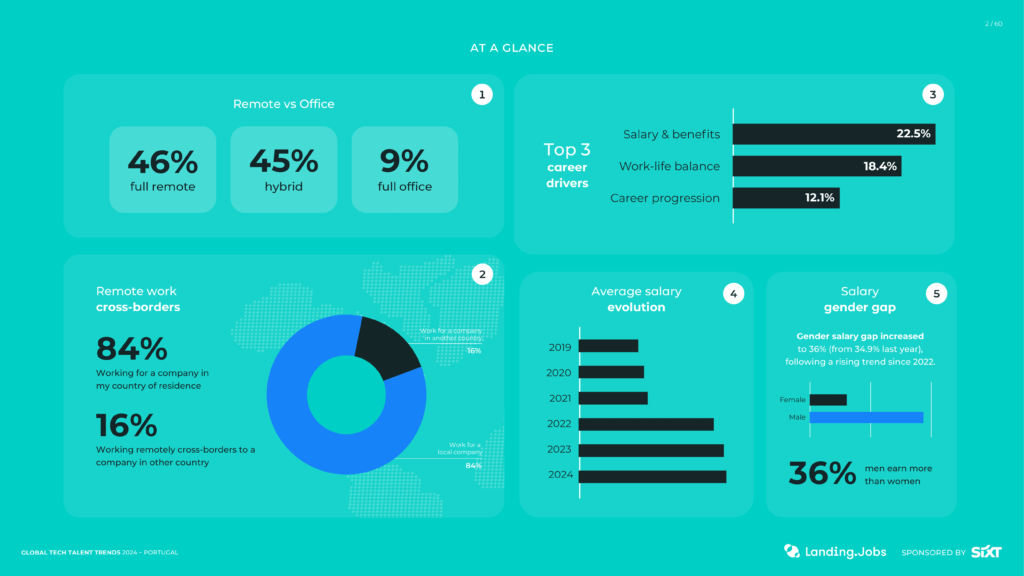The Global Tech Talent Trends 2024 Portugal report, kindly sponsored by SIXT, is finally out and it has some insightful data on the tech careers in Portugal. This year’s report major highlight is the continued stagnation of the market, which has had a serious impact on salaries and continued low motivation of IT professionals to change jobs.
Let’s start with crazy market facts:
- The gender salary gap increased to 36% (from 34.9% last year and 16.2% in 2021!).
- The considerable decrease in the percentage of IT professionals working remotely for companies cross-borders (22.6% in 2023 to 16% in 2024), a clear inversion on the trend of the previous two years.
- A reduction of the IT professionals working hybrid vs full- office (+3%) and full remote (+3.9%).
- The biggest increase (+5.1%) of non-Portuguese IT professionals (relocated to Portugal) in the country’s IT workforce.

The exclusive release of the Global Tech Talent Trends 2024 – Portugal, at Unicorn Factory in Lisbon
So, in a time like this, where professionals prioritise factors such as work-life balance, opportunities for career advancement, compensation and perks, alignment with company culture, and access to learning and development initiatives, how can businesses stay competitive? And what trends can professionals expect from the tech job market?
Landing.Jobs surveyed a total of 5.308 tech professionals residing in 127 countries who responded to the survey. Of those, 1.809 residing in Portugal were considered for producing the results in this report. This survey was open to the public from December 2023 to March 2024.
Global Tech Talent Trends 2024: Salaries, Tech stacks, Remote work and much more
The Global Tech Talent Trends 2024 Portugal report sheds light on the current state of tech careers in Portugal. Divided into professional roles & tech, career management, demographics, remote and global work, salary and perks, the report aims to help tech professionals make more informed career decisions and companies see where they stand.
Demographics

- As stated above, the salary gender gap is still a problem when talking about tech careers in Portugal and worldwide. According to the report’s data, 36% of men earn more than women.
- In addition, the Lisbon metro area representativity dropped from 52.2% in 2023 to 41.8% in 2024, a surprising reduction.
- The regions that gained representativity are Porto metro area and North, possibly signalling a change in the geographical distribution of IT talent in Portugal towards higher latitudes. Nevertheless, the two top metropolitan areas (Lisboa and Porto) hold residents of the vast majority of 67.7% of IT talent in Portugal.
Professional role & tech
The data remains clear, maintaining the trend of recent years. Full-stack, Back-end and Front-end developers continue to represent roughly half of all developers. These more general tech development categories, together with Data Scientists/Engineers are the ones with higher growth YoY. On the negative growth side, UX/UI designers had a considerable reduction in representativeness.
On the Tech management side, there have been considerable reductions in the Product Owner/Manager and Technical Team Leader positions and growth in the CTO / Heads of IT and Project Managers positions.
For the first year of this study, IT professionals with 9+ years of experience comprise more than 50% of the workforce. Even though there haven’t been drastic changes from last year, only the experience segments over 6 years of experience saw a growth in their representativeness, signalling an increase in the average experience of IT Professionals in Portugal.
“This shows aggressive market maturity but a very large imbalance” (Pedro Moura, Chief Growth Officer at Landing.Jobs)
Year-on-year data on programming languages is surprisingly stable. Variations from 2023 to 2024 are almost negligible, with the rank and market shares almost the same.
- TypeScript (+0.8%) is the programming language with the largest increase in market share year over year, continuing its increased importance. Of note is the fact that TypeScript has ‘passed’ Java from 2023 to 2024, certainly also due to the reduction of -0.4% in Java users.
- Python was the second generic language with the largest diminution (-0.3%).
- Also regarding SQL, not so much a programming language, but the percentage of respondents stating they use SQL has grown 0.9% YoY.
- .NET holds the 1st place in Frameworks usage, but at a 0.1% distance from React. Similarly to 2022 and 2023, and to the surprise of some, .NET remains the clear winner.
- Angular inverted the growth trend and fell from 3rd to 7th place in the rank (-0.6%).
- Node.js kept its rank but fell by -0.7%.
- Bootstrap (+0.8%) and Spring (+0.6%) are the frameworks that grew more YoY.
- Importantly, Javascript development frameworks make up more than 50%.
Remote and global work
The Global Tech Talent Trends 2024 report also showed some surprises. Ready?
- Hybrid fell by 6.9%
- Full office grew 3%
- And full remote also grew by 3.9%
- Remote vs. hybrid vs. office was a discussion that occupied a lot of 2023, and it still rages on. Breaking last year’s trend, full office work is making a comeback, and hybrid has also reversed the trend. Only full remote work continues in the same direction.
There was a significant increase of 5.1% in the representativeness of non-Portuguese IT professionals.
- Non-Portuguese IT professionals now make 15.7% of the residing IT workforce, with 10.6% originating from Brazil.
- The Porto metro area has the largest representation of non-Portuguese IT talent (21%, 16.9% originating from Brazil).
Is Porto more attractive to IT talent from abroad? The trend of more foreigners joining the Portuguese IT Workforce is good, but it should be accelerated to meet market needs in the forthcoming years.
Regarding working across borders, Portugal-based tech professionals working remotely for companies in other countries have decreased abruptly from 22.6% in 2023 to 16% in 2024. This is a clear inversion of the trend of the previous two years. Either way, this reduction of the IT workforce allocated to companies abroad may reduce the local IT professionals’ scarcity, putting negative pressure on salaries and increasing the difficulty of landing a new job for IT professionals.
Portuguese resident tech professionals tend to work remotely cross-borders mostly for European countries (63.8% from 71.6% in 2023), mostly for UK, DE and CH. The United States (19.1%) is the top destination country, and Brazil jumped (surprisingly?) to the 4th place (7.23%).
“We need to prove Portugal is fuck*ng worth to come live. First we need IT people from aboard, Portugal has a talent scarcity problem.” (Pedro Moura, Chief Growth Officer at Landing.Jobs)
Almost 100% consider working remotely for a company, around 50% for a company located in another continent.
Reasons to work remotely for a company across-borders
- Work-life balance is still the top reason to work remotely across borders.
- Salary and benefits come second, and working for international companies is third position.
- It seems that Portuguese tech professionals are becoming more interested in what international companies have to offer than Portuguese ones.
- Working remotely from wherever they want keeps losing importance for the second year in a row.
These stats show us that quality of life and better salary are perceptually associated with working remotely cross-borders.
Portuguese tech professionals aren’t keen on leaving their country. Nearly half would prefer to remain in Portugal, while the other half divide themselves between considering moving to a different European country or a different continent. Some want to stay, some want to go, practically no changes from 2022 and 2023, even though the percentage of respondents considering leaving Portugal has increased by 1.5%, maybe due to the current worsening of the conditions of the Portuguese IT talent market.
Career management
The Global Tech Talent Trends 2024 report has shown that salary and work-life balance matter to tech professionals.
- Money is still the top driver regarding career management, followed closed by work-life balance.
- On the other end of the spectrum, respondents don’t mind much about recognition and status or the impact of their work on society.
- Also, notice the increase in relevance of professional stability, possibly correlated to 2023 economic uncertainty, which has a negative impact on the IT jobs market.
- The biggest difference between contractors and full-time employees is still, by far, career progression. It’s clear that professionals with different work relations with their employers value different things.
- Full-time employees care much more about career progression and professional stability while contractors are more concerned about schedule flexibility and the impact of their work on society. Clearly, two different segments here, but with a kink: salary seems equally valued as a career driver. Finally, from 2023 to 2024, full-time employees started valuing work-life balance more than contractors.
- On motivation to change jobs, portuguese tech professionals are substantially more motivated to change jobs now than in 2023.
Salary and perks
Just like last year, the top perks for IT Professionals in Portugal are health benefits, annual bonuses, vacation/paid time-off and remote work opportunities.
By Region
- After a huge average increase from 2021 to 2022, salaries have stabilised into 2024 (but not decreased).
- Porto metropolitan area had the highest average increase in IT salaries.
- Tech professionals who work in the Lisbon metropolitan area still earn the most, 7.7% above the whole country average, but with a raise in average value from 2023 to 2024 of only 0.1%.
- Centre was the region with the second highest average salary raise (+6.8%), surpassing the North region to the 3rd rank position.
- The islands of Azores and Madeira continue to be the ones where salaries are the lowest, with a YoY variation of -0.0%.
By Roles
- Management roles pay better, and PhDs have solidly increased their average wages in the last years.
- As mentioned above, the gender gap in salaries is much higher in management roles, 58%, up from 47.4% in 2023 than in development roles (23.3%, down from 29.3% in 2023).
Other considerations: Top paying combination is non-relocated (i.e. PT naturals) working remotely for a company cross borders. By programming languages, Elixir, Go, and Rust make up the salaries podium.
You can be the greatest, you can be the best. We will make it a reality, simply and fast
 The exclusive release of the Global Tech Talent Trends 2024 Report at Factory in Lisbon, Portugal.
The exclusive release of the Global Tech Talent Trends 2024 Report at Factory in Lisbon, Portugal.
Whether you’re a professional, a company, or a recruiter, one thing is certain: the tech job scene is a jungle, and being equipped with the most up-to-date data on it is a clear advantage for making better-informed career decisions.
It’s essential for you to be aware of the changes and trends happening. While this blog post gives you an overview, looking at the full report will give you a more detailed outlook.
And if you are still curious, watch the full revision of the report by Pedro Moura and João Costa.
About our sponsor — SIXT
SIXT is a global mobility leader, revolutionizing the industry through digitalization. Their tech team contribute to innovative solutions like IoT, fleet management, and automated pricing, building microservices on AWS, ensuring top-notch performance, scalability, resilience, and security for systems serving millions of customers and vehicles daily.
Their sponsorship of this report underlines our belief in the importance of understanding the ever-evolving landscape of the tech industry and the critical role that talent plays in driving innovation and growth. By gaining insights into the trends and challenges facing the worldwide IT talent market, we empower both IT professionals and companies with invaluable insights to cultivate the best environment for the individuals driving our community forward.






0 Comments